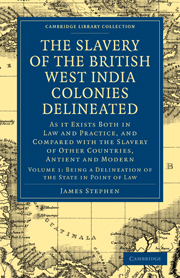 The Slavery of the British West India Colonies Delineated
The Slavery of the British West India Colonies Delineated Book contents
- Frontmatter
- PREFACE
- Contents
- PRELIMINARY CHAPTER: Of the Necessity and Importance of describing the State in question, and the general Plan of the Work
- BOOK I OF THE SLAVERY OF OUR COLONIES CONSIDERED AS A LEGAL INSTITUTION
- CHAPTER I Of the Origin and Authority of the Colonial Slave Laws in general
- CHAPTER II Of the Persons who are subject to Slavery in our Colonies
- CHAPTER III Of the legal Nature and Incidents of this Condition, as they respect and constitute the Relation between the Slave and his Master
- CHAPTER IV Of the legal Nature and Incidents of Colonial Slavery, as they respect its Relations to Persons of Free Condition in general, the Master and his Delegates excepted
- CHAPTER V Of the legal Nature and Incidents of West India Slavery, in its Relations to the Police and Civil Government of the Country
- CHAPTER VI Of this State of Slavery in respect of its Commencement and Dissolution
- Appendix, No. 1
- Appendix, No. II
- Appendix, No. III
- Appendix, No. IV
- Appendix, No. V
CHAPTER I - Of the Origin and Authority of the Colonial Slave Laws in general
Published online by Cambridge University Press: 07 October 2011
- Frontmatter
- PREFACE
- Contents
- PRELIMINARY CHAPTER: Of the Necessity and Importance of describing the State in question, and the general Plan of the Work
- BOOK I OF THE SLAVERY OF OUR COLONIES CONSIDERED AS A LEGAL INSTITUTION
- CHAPTER I Of the Origin and Authority of the Colonial Slave Laws in general
- CHAPTER II Of the Persons who are subject to Slavery in our Colonies
- CHAPTER III Of the legal Nature and Incidents of this Condition, as they respect and constitute the Relation between the Slave and his Master
- CHAPTER IV Of the legal Nature and Incidents of Colonial Slavery, as they respect its Relations to Persons of Free Condition in general, the Master and his Delegates excepted
- CHAPTER V Of the legal Nature and Incidents of West India Slavery, in its Relations to the Police and Civil Government of the Country
- CHAPTER VI Of this State of Slavery in respect of its Commencement and Dissolution
- Appendix, No. 1
- Appendix, No. II
- Appendix, No. III
- Appendix, No. IV
- Appendix, No. V
Summary
Slavery was introduced and established in our colonies in a manner very different from that which is commonly supposed. It was not there originally derived from, nor is it yet expressly sanctioned or defined by any positive laws;—it stands, for the most part, on the authority of custom alone.
The Assemblies have often, indeed, in their acts, recognized slavery as an existing institution; and have, by directing or regulating the sale of slaves, and by numerous other provisions, treated them as subjects of property. But if the books of colonial acts were resorted to for information as to the legal origin of this state, the rights which it gives to the master, or the duties and incapacities which it imposes upon the slave, no satisfaction on these important heads would be found.
We have often heard from the agents and advocates of the colonies, of their system being sanctioned by parliament; yet our statutes will be found guiltless of having created the slavery in question, or sanctioned any of those harsh properties and incidents which distinguish it from other states known by the same odious name.
The bringing labourers or negroes from Africa was certainly permitted, and even encouraged, by parliament; and in the more modern acts there was no reserve in respect to the condition of these exiles, as far as a vague name could define it; for the commerce in Slaves, eo nomine, has been expressly recognized and regulated.
- Type
- Chapter
- Information
- The Slavery of the British West India Colonies DelineatedAs it Exists Both in Law and Practice, and Compared with the Slavery of Other Countries, Antient and Modern, pp. 14 - 26Publisher: Cambridge University PressPrint publication year: 2010First published in: 1824


